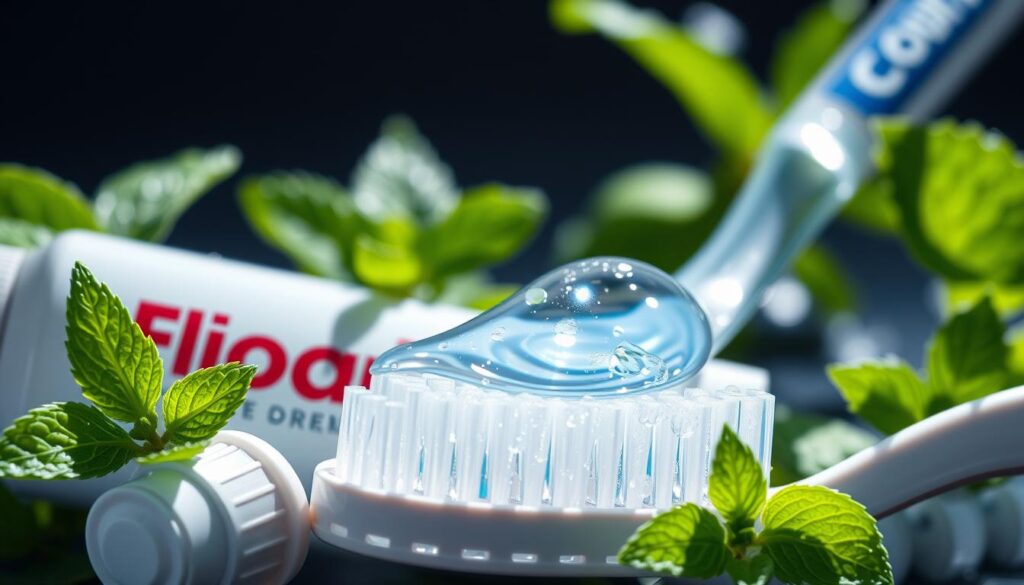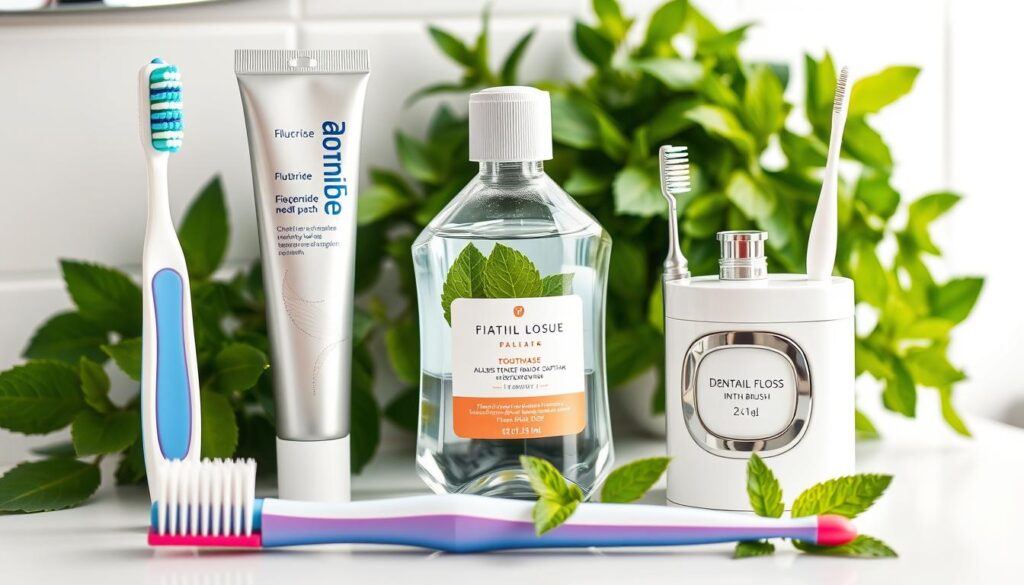Every morning and night, I brush my teeth as part of my self-care. This habit helps prevent cavities and diseases1. It’s more than just a routine; it’s key to my oral health and a bright smile.
Dental hygiene combines daily routines and diet to show my body’s health. Flossing helps prevent heart health issues1, and eating less sugar keeps bacteria away1. These simple actions are crucial for a healthy smile.
A balanced diet is essential for my gums and teeth, filled with veggies and water12. Drinking water helps clean my mouth by removing food bits2. Regular dentist visits catch and treat decay early13, making my oral care complete.
Key Takeaways
- Brushing teeth twice a day is key to avoiding dental problems13.
- Flossing helps prevent serious health issues1.
- Fluoride toothpaste helps protect and fix early decay1.
- Eating less sugar lowers the risk of cavities by controlling bacteria1.
- Drinking water is crucial for a clean mouth2.
- Regular dentist visits are important for good dental hygiene13.
- Using mouthguards and taking care of dental tools is key to dental health3.
The Truth About Brushing: Why It’s the Cornerstone of Dental Care
Brushing your teeth is key to good dental health. It’s not just a simple task; it’s a vital defense against many oral health problems. Let’s see how brushing well keeps you healthy and why it’s crucial for good oral hygiene.
Understanding Plaque and Its Effects on Oral Health
Plaque is a big problem for your mouth. It causes tooth decay and gum disease. Studies show that regular brushing can help stop these problems4. Brushing right gets rid of plaque and stops these diseases. This not only fights cavities but also prevents serious gum disease that many people get5.
Choosing the Right Toothbrush and Toothpaste
Choosing the right toothbrush and toothpaste is important for cleaning your teeth well. Dentists suggest using a soft-bristled brush to avoid hurting your gums. Using toothpaste with fluoride is also key because it strengthens your teeth and can even fix early tooth decay. Remember to change your toothbrush every 10-12 weeks for the best results5.
Brushing Techniques for Maximum Cleanliness
Brushing right is more than just rubbing your teeth twice a day. Using circular motions with your brush gets rid of more plaque than back-and-forth strokes5. Make sure to brush for two minutes to clean all parts of your mouth. This helps remove food and bacteria that can cause mouth diseases.
| Brushing Habit | Impact on Oral Health |
|---|---|
| Regular brushing and flossing | Prevents cavities and gum disease6 |
| Using fluoride toothpaste | Reverses early signs of decay |
| Soft-bristled toothbrush | Protects gums from damage |
| Replacing toothbrush regularly | Ensures effective cleaning5 |
Good dental care is not just for looks; it’s a key part of your health. By making these habits part of your daily life, you keep your smile bright and healthy. Remember, keeping your mouth healthy takes effort, the right tools, and good brushing techniques.
Unveiling the Importance of Fluoride in Oral Hygiene
Fluoride toothpaste is key to keeping teeth strong and preventing decay, especially in kids7. It makes tooth enamel stronger, fighting tooth decay effectively.
Fluoride does more than just strengthen enamel. It helps repair early decay through a process called remineralization. This is why Knoxville Pediatric Dentistry recommends fluoride treatments during check-ups7.

It’s important to use the right amount of fluoride toothpaste for your age. Too much can cause fluorosis, but not enough might not protect your teeth well7. Dental health experts can guide you on how much to use.
Fluoride is also found in water, supplements, and some foods. Eating foods like fruits, veggies, dairy, and whole grains helps fluoride work better7.
New dental materials show how effective fluoride can be. For example, glass-ionomer cements release fluoride slowly, helping prevent decay for a long time8. They are better than traditional composites at keeping fluoride levels steady, which is key for good oral health8.
Saliva is also important for fluoride to work well. It spreads fluoride around your mouth and keeps fluoride levels right for preventing cavities8. This shows how important mouth health is for fluoride to do its job.
| Aspect | Benefit |
|---|---|
| Enamel Strengthening | Increased resistance to acid attacks from bacteria7 |
| Remineralization | Helps repair early decay8 |
| Consistent Fluoride Release | Long-term decay prevention through advanced dental materials8 |
| Diet | Supports dental health and complements fluoride efficacy7 |
Using fluoride toothpaste, getting regular dental care, and eating well can keep your teeth healthy and strong. This helps prevent decay and keeps your smile bright.
How a Balanced Diet Contributes to Oral Health
Looking into the link between a healthy diet and dental health shows deep connections. A balanced diet does more than just feed us. It also strengthens our teeth and gums, which is key for good oral hygiene.
Nutrients That Benefit Teeth and Gums
A diet full of important nutrients boosts dental health. Foods like milk, cheese, and yogurt are great for teeth because they have calcium and phosphorus9. Citrus fruits and strawberries are packed with Vitamin C, which keeps gums strong9. Carrots and leafy greens have Vitamin A, which is good for gums too9.
The Impact of Sugar on Dental Hygiene
It’s important to eat less sugar for good dental health. Sugar and bacteria in the mouth make acids that can harm teeth9. Foods like citrus fruits and soda can wear down tooth enamel9. Dried fruits stick around in your mouth, keeping sugar levels high and increasing tooth decay risk9.
Hydration and Its Role in Maintaining a Healthy Mouth
Drinking enough water is key for a healthy mouth. Water helps make saliva, which fights acids and cleans food bits. Drinking water with fluoride can even help fix tooth enamel and stop decay9.
Choosing a healthy diet, eating less sugar, and drinking water are the basics of good dental care. These habits not only make your mouth healthier but also boost your overall health.
In summary, eating well supports your health and fights oral health problems. From vitamins that help gums to eating less sugar, every choice helps your dental hygiene.
The Hidden Dangers of Neglecting Dental Flossing
Flossing is key to good dental care and preventing health problems. Gum disease is a big concern that affects more than just our teeth. Not flossing daily can lead to gum disease, which may cause heart disease and diabetes110
Not flossing also has other risks. Bacteria in an unclean mouth can travel through the body. This can make arteries narrow and increase the risk of heart attack and stroke1. Not brushing regularly can also lead to breathing problems, making pneumonia and chronic bronchitis more likely11
Flossing removes plaque and harmful bacteria. Without it, you could face serious dental and health issues, like cavities and Alzheimer’s disease11
| Health Complication | Associated Cause |
|---|---|
| Cardiovascular Disease | Dental bacteria entering bloodstream |
| Respiratory Infections | Inhalation of harmful bacteria from infected gums |
| Diabetes Complications | Gum disease making blood sugar control more difficult |
| Dementia/Alzheimer’s Disease | Chronic inflammation from gum disease |
| Premature Births | Gum disease during pregnancy |
Adding flossing to my daily routine has boosted my oral health and helped prevent bigger health issues. It reaches areas my toothbrush misses, keeping me safe from serious conditions.
Brushing is important, but preventing gum disease means more. Flossing is essential for good dental care, protecting us from hidden dangers. It’s crucial to see the link between our mouths and our overall health. So, making flossing a key part of our daily routine is smart for our health and future.
Comprehensive Dental Hygiene: The Role of Regular Dentist Visits
Starting a journey to better dental health begins with understanding the importance of regular dental check-ups and professional care. Some parts of dental care can only be handled by a dentist.
Early Detection and Prevention of Tooth Decay
Dentists can spot early signs of tooth decay and other dental problems during routine oral examinations. Catching these issues early can prevent more serious problems later. These check-ups include X-rays and visual checks to find hidden problems. This way, treatments can be less invasive and timely1213.
Professional Teeth Cleaning: Beyond What You Do at Home
While brushing and flossing at home is key, professional cleaning at the dentist goes deeper. It removes plaque and tartar that home care might miss. Dentists also give personalized advice to improve your oral health habits1213.
Regular dentist visits build trust and familiarity. This makes it easier to talk about any dental concerns and get care that fits your needs12.
Adding regular dental check-ups to your routine is crucial. It’s not just about preventing dental problems. It’s also about keeping your mouth healthy, which supports your overall health. Dentists check for signs of other health issues, making these visits key to your health care13.
Choosing and Using Dental Hygiene Products Effectively
Choosing the right dental hygiene products is key to keeping your mouth healthy. It’s not just about picking the right tools. It’s also about knowing how to use them right to get the most out of them.
Identifying the Best Dental Hygiene Products for Your Needs
When picking dental hygiene products, the right choices can boost your oral health. Electric toothbrushes, for example, beat manual ones in fighting plaque and gingivitis14. Soft bristles are best because they’re easy on your gums but still clean well15. If flossing is hard, water flossers are a great option, especially for those with braces or special dental needs15.
Correct Usage of Mouthwashes for Optimal Oral Health
Mouthwash is a big part of dental care, helping to cut down on plaque and gingivitis. Mouthwashes with things like fluoride, chlorhexidine, and essential oils are good for your mouth. Fluoride makes teeth stronger and helps prevent cavities15. Chlorhexidine is great for fighting gingivitis and plaque15. Essential oils in mouthwash also help reduce plaque and keep gums healthy15. But remember to swish mouthwash around your mouth for at least 30 seconds to work best14.
| Product Type | Benefits | Recommended Use |
|---|---|---|
| Electric Toothbrush | Reduces plaque and gingivitis effectively | Two minutes, twice daily |
| Water Flosser | Effective for braces and specific dental needs | Once daily |
| Mouthwash with Fluoride | Strengthens enamel, prevents cavities | 30 seconds, twice daily |
| Chlorhexidine Mouthwash | Controls gingivitis and plaque | 30 seconds, once daily |

Personalizing your dental care with the right products is key. It’s not just about better oral health. It’s also about fitting your routine to your life and dental needs. By picking the right dental products and using them right, you can greatly improve your oral health and keep your smile bright1416.
The Connection Between Hydration and a Healthy Smile
Hydration is key to a healthy mouth. It helps with saliva production, which is crucial for dental health17. Saliva cleans the mouth by removing food bits and neutralizing acids17. Being well-hydrated can lower the risk of tooth decay and gum disease17.
Drinking water is vital for your health, especially for your teeth. Aim for about eight 8-ounce glasses a day to keep your mouth healthy17. Every drink of water helps stop tooth decay by washing away harmful acids18.
Hydration keeps your mouth’s pH level neutral, stopping bacteria from growing18. A dry mouth lets bacteria spread, causing bad breath and more cavities17. So, staying hydrated fights bad breath and other dehydration problems.
Make sure to drink enough water for your health and your teeth. Here’s how different drinks affect your mouth:
| Beverage | Impact on Dental Health | Hydration Level |
|---|---|---|
| Water | Flushes debris, supports saliva production | High |
| Sugary Drinks | Increases risk of cavities and enamel erosion | Low |
| Diet Sodas | Acidic; can still contribute to enamel degradation | Low |
| Fruit Juices | Can be high in sugar; acidic nature harms teeth | Medium |
Water is the best drink for your teeth and saliva production18. It keeps you hydrated and your mouth clean18. Drinks with sugar can lead to more bacteria and worse dental health, making water the top choice17.
Drinking enough water daily is a simple way to boost your dental care. If your urine is pale and straw-colored, you’re well-hydrated, which helps your mouth stay healthy17.
Oral Care Beyond the Teeth: Don’t Ignore Your Tongue
Looking after your mouth means not forgetting about tongue cleaning. This often-overlooked step is key for fighting bad breath and keeping your mouth clean. Bacteria and food bits can stick to your tongue, causing health problems and bad smells.
Adding tongue cleaning to your daily routine can really boost your oral hygiene. Using a tongue scraper or a special toothbrush for your tongue helps remove the white or yellow coating. This simple action stops the growth of bacteria that cause bad breath.
Good oral care is about more than just looking good or smelling nice; it’s linked to your health. Studies1920 show poor oral hygiene can lead to heart disease, diabetes problems, and breathing issues. The tongue is a key part of keeping your mouth healthy and balanced.
| Aspect | Benefits of Tongue Cleaning |
|---|---|
| Bad Breath Prevention | Removes bacteria and food particles that cause odors |
| Overall Oral Hygiene | Contributes to a cleaner, healthier mouth |
| Health Implications | Reduces risk of oral-systemic health issues |
By including tongue cleaning in your oral care routine, you can greatly improve your life. Keeping your mouth clean and healthy protects you from health issues and keeps your breath fresh.
Smart Habits: Reducing Sugar and Embracing a Mouth-Healthy Diet
Choosing the right foods and drinks is key to a healthy mouth. Cutting down on sugar helps prevent tooth decay and boosts dental health. Avoiding sugary drinks and snacks reduces acid attacks on teeth, which stops bacteria from growing and causing cavities2122. Switching to snacks like crunchy fruits and veggies helps clean teeth and boosts saliva, a natural cavity fighter22.
Reducing sugar means knowing which foods are better and adding them to our diet. Raw veggies and popcorn are great snacks instead of candies and soda, making our diet healthier23. Drinking enough water is also key, as it washes away food bits and bacteria, keeping our mouths clean23.
- Dairy products, full of calcium and phosphorus, help fix tooth enamel and are key for a healthy mouth21.
- Foods packed with antioxidants and nutrients like Vitamin C, Vitamin D, and magnesium make teeth and gums stronger, fighting gum disease and decay21.
Eating a balanced diet with these nutrients keeps teeth and gums strong and prevents dental diseases. Choosing to eat less sugar and a mouth-healthy diet is crucial for our health21.
Preventative Measures: Oral Care During Physical Activities
Playing sports can increase the risk of dental injuries. That’s why dental protection is crucial. Mouthguards help prevent damage to teeth, gums, and the mouth during sports like football, basketball, and boxing. They absorb forces that could cause serious injuries, such as chipped teeth or jaw fractures24.
What you eat can also affect your oral health during exercise. Eating too many sports drinks, gels, and bars can lead to tooth decay and cavities24. Athletes should drink water or low-sugar sports drinks to keep their mouths healthy. This helps fight off harmful bacteria24.
Regular dental check-ups are key to preventing oral injuries. These visits help catch and treat problems early, like gum disease and cavities. This keeps your teeth and mouth healthy and prevents bigger issues2425.
Custom-made mouthguards from a dentist offer better protection than over-the-counter ones. They fit your mouth perfectly, making them more comfortable and effective24.
For athletes, good dental care is about more than just avoiding injuries. It’s also about staying focused and performing well. Oral pain can distract you and affect your training and competitions24. So, taking care of your teeth is a key part of being a top athlete.
Choosing professional mouthguards or keeping up with good oral hygiene during sports is important. The goal is to protect your teeth and prevent injuries. This way, you can enjoy your sports without worrying about your mouth24.
Keeping your mouth healthy with the right gear and habits is key to your dental and overall health. It helps you perform at your best without oral health issues holding you back.
Conclusion
Looking back at the articles, I’ve learned a lot about the importance of dental hygiene. It’s not just about looking good. It’s key for staying healthy and well. By brushing, flossing, and using mouthwash, eating right, and seeing the dentist regularly, we keep our mouths healthy.
The Wisconsin Medical-Dental Integration program shows how good dental care can make a big difference26. It uses Medicaid providers to make dental care easier to get. This helps more people keep their teeth healthy26. Plus, regular dental care stops gum disease and tooth decay, which can also prevent serious health problems27.
More dental hygienists are working to help us keep our teeth healthy26. Using community health models and getting regular dental cleanings is smart. It leads to a healthier life27. So, every choice I make about my dental care is a step towards a better life.
FAQ
What are some essential dental hygiene tips for a healthy smile?
How does plaque affect oral health?
What should I consider when choosing a toothbrush and toothpaste?
What are the recommended brushing techniques?
Why is fluoride important in oral hygiene?
How does diet contribute to dental health?
Why is flossing an important part of dental care?
How often should I visit the dentist?
How do I choose the right dental hygiene products?
How does saliva production aid in dental hygiene?
Why is tongue cleaning important in oral health care?
How can I maintain dental hygiene with a mouth-healthy diet?
Should I wear a mouthguard during physical activities?
How does maintaining a dental hygiene routine impact overall health?
Source Links
- Get Your Healthy Smile with Our Top 10 Dental Care Tips – https://www.smiledentalgroup.com/top-10-dental-care-tips-for-a-healthy-smile/
- The Ultimate Guide to Dental Hygiene: Tips for a Healthy Smile | St. Lawrence Dentistry – https://www.stlawrencedentistry.com/blog/dental-health/the-ultimate-guide-to-dental-hygiene-tips-for-a-healthy-smile/
- 10 Dental Care Tips for a Healthy Smile | Dr. Q Dental – https://drqdental.net/blog/10-essential-dental-care-tips-healthy-smile/
- Oral Hygiene – https://www.nidcr.nih.gov/health-info/oral-hygiene
- Why Dental Hygiene is Important – Brighter Smiles Family – https://www.brightersmilesia.com/why-dental-hygiene-is-important/
- Mastering Oral Health: Decoding the Golden Rule for Hygiene – https://www.timberdentalcolorado.com/mastering-oral-health-golden-rule-for-hygiene/
- Unveiling the Power of Fluoride – https://kpdentistry.com/blog/unveiling-the-power-of-fluoride-a-shield-against-tooth-decay/
- Role of Fluoride in Dentistry: A Narrative Review – https://www.ncbi.nlm.nih.gov/pmc/articles/PMC10799546/
- Diet and Its Impact on Oral Health | Needham, Bedford, Franklin, MA – https://chestnutdental.com/blog/diet-and-its-impact-on-oral-health/
- The Hidden Dangers of Neglecting Regular Dental Cleanings – https://bestsmilesdentist.com/the-hidden-dangers-of-neglecting-regular-dental-cleanings/
- The Hidden Dangers of Neglecting Your Oral Hygiene | Largo – https://www.mouthdocs.com/the-hidden-dangers-of-neglecting-your-oral-hygiene/
- Why is Visiting the Dentist Important for My Oral Health? – https://www.riggsfamilydental.com/why-visiting-dentist-important-for-oral-health/
- Prioritize Your Oral Health: The Crucial Role of Routine Dental Visits – https://yourdentalhealthpartners.com/prioritize-oral-health-role-routine-dental-visits/
- A Guide To Choosing Dental Care Products | Mulgrave Dental – https://www.mulgravedentalgroup.com.au/blog/a-guide-to-choosing-dental-care-products
- How to Choose the Right Oral Health Tools | Needham, Bedford, Franklin, MA – https://chestnutdental.com/blog/how-to-choose-the-right-oral-health-tools/
- 5 Top Dental Hygiene Tools To Use At Home – https://ormondperio.com/blog/5-top-dental-hygiene-tools-to-use-at-home
- Hydration for a Healthy Smile: The Impact of Hydration on Oral Health – https://www.sunshinecitydentistry.com/post/hydration-for-a-healthy-smile-the-impact-of-hydration-on-oral-health
- Drinking More Water: the Key to a Healthy Smile | Newberg Dental – https://www.newbergcommunitydental.com/drinking-more-water-the-key-to-a-healthy-smile/
- Oral health: A window to your overall health – https://www.mayoclinic.org/healthy-lifestyle/adult-health/in-depth/dental/art-20047475
- Taking Care of Your Teeth and Mouth – https://www.nia.nih.gov/health/teeth-and-mouth/taking-care-your-teeth-and-mouth
- Diet and Its Impact on Oral Health | Altoona, IA | Altoona Smiles – https://altoonasmiles.com/blog/diet-and-its-impact-on-oral-health/
- Sugar Intake Impact: Healthy Choices For Life – https://westallissmiles.com/tag/sugar-intake/
- 10 Eating Habits That Will Revolutionize Your Dental Health – https://www.dbdentalcarevt.com/blog/322350-10-eating-habits-that-will-revolutionize-your-dental-health
- Oral Health Strategies for Athletes | Downtown Seattle Dentist – https://www.aestheticdentalassoc.com/blog/oral-health-strategies-for-athletes/
- What Are Some Preventative Measures for Dental Health? – Southside Medical Center – https://southsidemedical.net/what-are-some-preventative-measures-for-dental-health/
- Advancing Oral Health Equity through Medical-Dental Integration: Dental hygienists as catalysts for change in an evolving health care system – https://jdh.adha.org/content/98/3/8
- Oral Hygiene is Related to Overall Health – Davis & Dingle Family Dentistry Columbia South Carolina – https://davisanddingle.com/blog/oral-hygiene-is-related-to-overall-health/



